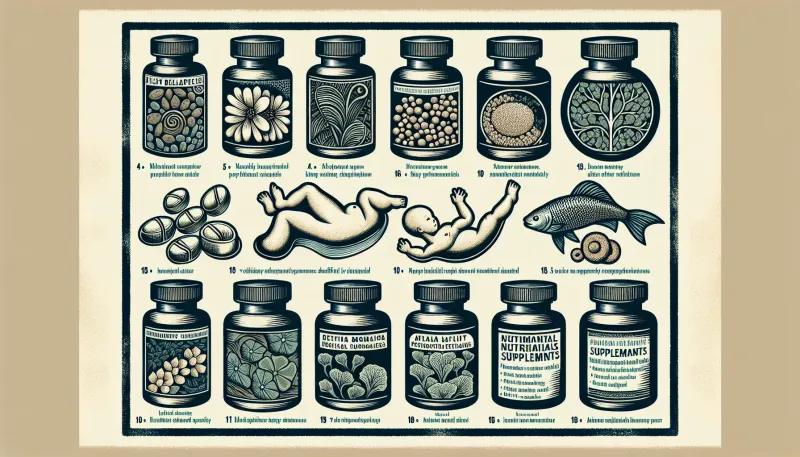Top 10 Nutritional Supplements for Prenatal Care: What You Need to Know

Discover the top 10 nutritional supplements for prenatal care to ensure a healthy pregnancy. Learn about their benefits, recommended dosages, and safety precautions.
Ensuring sufficient nutrient intake during pregnancy is pivotal for both the mother's and the baby's health. Unfortunately, even a balanced diet might not provide all the necessary nutrients. Nutritional supplements for prenatal care can fill this gap, promoting a healthy pregnancy and reducing the risk of complications. This comprehensive guide delves into the top 10 supplements you need to know about.
1. Folic Acid
Folic acid is undeniably the most critical supplement for prenatal care. It plays a crucial role in the formation of the neural tube, reducing the risk of neural tube defects such as spina bifida. Pregnant women are advised to take 400-800 micrograms daily before and during early pregnancy. Foods rich in folic acid include leafy greens, beans, and citrus fruits, but supplementation ensures more consistent levels.
2. Iron
Iron is essential for the production of hemoglobin, which transports oxygen in the blood. Pregnancy increases a woman's blood volume, necessitating higher iron intake to prevent anemia and associated fatigue. Prenatal supplements typically contain 27 milligrams of iron. Foods like lean meats, spinach, and lentils are good sources, but supplements can ensure adequate levels.
3. Calcium
Calcium supports the development of the baby's bones and teeth. Pregnant women need around 1,000 milligrams of calcium daily. Insufficient calcium can lead to maternal bone loss as the body diverts calcium to the baby. Dairy products, fortified plant milk, and leafy greens are excellent sources, but a supplement may be necessary to meet the higher demands of pregnancy.
4. Vitamin D
Vitamin D works hand-in-hand with calcium to ensure proper bone health. It also supports immune function and modulates cell growth. The recommended intake is 600 IU daily, but some may need more based on their current levels. Sunlight exposure, fatty fish, and fortified foods provide vitamin D, but a supplement is often critical, especially in less sunny climates.
5. Omega-3 Fatty Acids
Omega-3 fatty acids, particularly DHA, are vital for the baby's brain and eye development. Pregnant women should aim for at least 200-300 milligrams of DHA daily. Sources include fatty fish like salmon and sardines, but fish oil supplements are often recommended to ensure adequate intake.
6. Iodine
Iodine is crucial for the production of thyroid hormones, which regulate metabolism and development. Pregnant women need 220 micrograms daily. Iodine deficiency can lead to impaired cognitive function in babies. Iodized salt, dairy, and seafood are good sources, but a supplement can help maintain necessary levels.
7. Vitamin B6
Vitamin B6 supports brain development and the production of neurotransmitters. It also helps alleviate morning sickness. The recommended daily intake is 1.9 milligrams. Foods like bananas, chicken, and whole grains provide vitamin B6, but supplements can be beneficial, especially for nausea relief.
8. Magnesium
Magnesium is essential for muscle and nerve function, blood sugar control, and bone development. Pregnant women need approximately 350-400 milligrams daily. Deficiency can lead to preterm labor and hypertension. Nuts, seeds, and whole grains are good sources, but supplements can ensure optimal levels.
9. Vitamin C
Vitamin C aids in tissue repair, wound healing, and immune function. It also enhances iron absorption, which is critical during pregnancy. The recommended daily intake is 85 milligrams. Citrus fruits, strawberries, and bell peppers are rich in vitamin C, but supplements can provide additional support.
10. Zinc
Zinc plays a key role in DNA synthesis, cell division, and immune function. Pregnant women need 11 milligrams daily. Deficiency can lead to impaired growth and development. Meat, dairy, and legumes are good sources, but supplements can help maintain adequate levels, especially in vegetarians.
Choosing the Right Prenatal Supplements
When selecting prenatal supplements, it's crucial to consult with a healthcare provider for personalized recommendations. Considerations include diet, health status, and specific nutritional needs. Opt for high-quality, third-party tested brands to ensure safety and efficacy.
Conclusion
Proper nutrient intake during pregnancy is non-negotiable for the health of both mother and baby. While a balanced diet is the foundation, nutritional supplements for prenatal care provide essential benefits that might otherwise be overlooked. From folic acid to zinc, each supplement plays a unique role in supporting a healthy pregnancy. Consult with a healthcare provider to create a tailored supplementation plan that meets your individual needs.



























